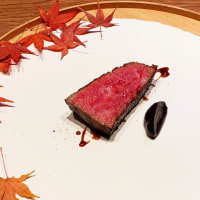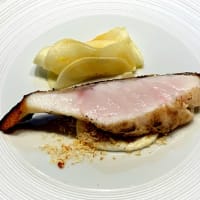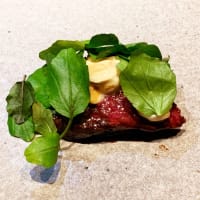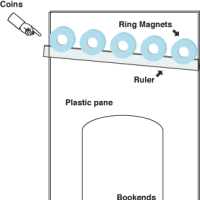
The Other Side of the Hedge: E. M. Forster
High school students challenged me on "The Other Side of the Hedge" by Edward Morgan Forster. I think it is because they needed to write an essay about the story and knew my interpretation would be unique.
The story is narrated by a man who is exhausted of a compulsory journey on the road that is "monotonous, dusty, with brown cracking hedges on either side." Enticed by a puff coming from the hedge and a glint of light through the tangle of boughs and dead leaves , he decides to see what is on the other side. He manages to go through the hedge with a strenuous effort and finds himself submerged in cold water. There he encounters a man who explains to him the world is dead-end but shows two gates and roads. He argues with the man over the importance of advancement and the reason to keep walking. The world on the other side is too confined and the residents seem too peaceful for him to trust. He refuses to sleep there or join them in their meals. A man with a scythe over his shoulder and a can of some liquid in his hand passes by. He snatches the can and drinks it. He experiences the extraordinary sound, odor and vision before his senses sink into oblivion. As he does so, he realizes the man with the scythe is his brother.
My view of this short story is that Forster described the "Internal Utopia," contrasting it to the civilized life. It is beautifully written. All sorts of symbols including "dusty monotonous road" and "brown cracking hedges" are included. This book demands certain knowledge of classic literature. For example, the gates of ivory and horn are derived from Greek mythology.
The Other Side of the Hedge is an allegory. It is important to understand relationship between concrete objects and abstract concepts. The following is my interpretation.
The Gates of Ivory and Horn:
In Homer's Odyssey, Penelope mentions: "For two are the gates of shadowy dreams, and one is fashioned of horn and one of ivory." It reads that men see false dreams through the ivory gate, while the horn gate usher in true issues. This is a clue to clarify the nature of "the other side of the hedge."
The Road:
The road and the pedometer represent the life and the age, respectively. Forster views that ordinary lives are monotonous and competitive. In this story, people including Miss Eliza Dimbleby, the great educationist, are obsessed by walking on the dusty road. It is "shocking thing to stop walking." The road also represents a civilization history. When humanity saw a "false dream" through the Ivory Gate, its quest on the road, that is civilization started. The irony is that nobody knows the goal although everybody on the road believes in the "quest." Also note that there are only people on the road.
The Park or Garden:
The garden represents "Internal Utopia" where the truth and virtue materialize. The narrater regards it as a prison and the hedge as a barrier that prevent him from going back to the road. He obstinately spurns everything in the world on the other side. He states, “This is perfectly terrible. One cannot advance: one cannot progress. Now we of the road -." Evidently he believes in advancement of science and competitions in life. Only when he glimpses the road through the Gate of Horn, he acquiesces in the truth and takes a drink.
The Hedge:
The hedge is brown on the road but green on the other side. It separates toilsome life and serene Utopia. The barrier is thicker in some area but penetrable in various places. Many walkers are occupied by the progress on the road too much to notice such variegation. However, some are curious enough to attempt a traverse.
The slumber:
The slumber represents spiritual awakening, which Forster frequently utilizes in his writings. The narrater senses "the magic song of nightingales, and the odour of invisible hay, and stars piercing the fading sky." This intimates his entrance into the Utopia. It completes his transformation that was initiated by the symbolic burial of old himself on the road, that is, immersion in cold water.
The scythe:
Honestly, I have no idea what it symbolizes. My excuse is that Forster simply tried to create an allegory with a hint of a fantasy. The sudden appearance of the scythe definitely confused me and stimulated the imagination.
The Other Side of the Hedge is my favorite short story. Forster always remains ambivalent. His view is unfathomable from his work, which makes him more intriguing. It is like Venus de Milo, missing arms.
フォースターの「垣根の向こう側」(訳本は檸檬社から出ている:ISBN4-7733-3967-5)について。この短編は最も気に入っている話の一つである。原文は、9月26日と9月27日のブログに掲載した。幻想的で寓意の濃い話で色々と考えさせられる。寓意物語(Allegory)なのでどの抽象的概念がどんな具象的なもので比喩されているかをはっきりさせないと全文の解釈ができない。もちろんフォースターは常に態度保留を貫いているので、彼自身の考えを見つけるのは難しい。一人称で語られたこの話の中の、「私」のつぶやきを彼自身の声と信じたい。
あらすじ:
まず、物語は果てしなく続く道を先を急いで歩いていく人々のなかで、落ちこぼれそうになる若者を描写する。疲労困憊した彼は立ち止まり、ふと垣根の向こうを覗いてみたくなる衝動に駆られる。大変な苦労をしてやっと垣根を通り抜けたと思った瞬間に彼は水の中に沈んでいく。浮かび上がったときに彼は一人の男と出会い、彼にこの世界はどこへも続く道のない場所だと告げられる。袋小路のような場所では進歩がない、住んでいる人々も信じられないと、彼は垣根の向こう側の世界に住むことを拒否する。食べ物を受け付けず、眠ることもしない。男は彼に2つの門を紹介する。象牙の門と角の門である。彼は角の門を通して道路を見たとき、初めて自分の過ちに気づく。そして、通りがかった男の持っていたビールを飲み、意識を失っていく。その時、彼の感覚は研ぎ澄まされ、不思議な音、匂い、光景を経験する。そして、彼が飲んだビールを持っていたのは彼の兄弟だったことを知る。
象徴について:
道路は人生であり、また人類の辿ってきた文明化の道でもある。大事な背景として、ギリシャ神話がある。ホメロスのオデッセイに、象牙の門と角の門がでてくる。象牙の門を通して見えるのは虚の夢、角の門を通して見えるのは真の姿である。主人公は角の門を通して道を見た時に今まで先を急いで歩いていた道の本当の意味を知るのである。さらに、ビールを飲んで意識が遠くなるのは、悟りを開くことを意味している。フォースターは眠りを開眼の象徴としてよく使うので間違いないと思う。そう考えると、「垣根の向こう側」は天国ではなく、内面的な楽園と考えるのが自然だろう。
解釈:
主人公の若者は、科学の進歩と競争社会が人類の文明化を進めてきたと信じている。偉大な教育者ですらひたすらなる前進を勧めている。人生に疲れ切った彼は、垣根の向こう側からの誘いに乗って反対側へ向かう。大変な努力を要したことは悟りを開くのは容易でないことを意味している。水の中に沈むのは埋葬の象徴で、古い自分の死(再生)を意味する。フォースターの住んでいた西洋社会は火葬の習慣がないので自然である。彼は当初、新しい世界に途惑うが角の門を通して外界を見て真実を知る。象牙の門は幻に誘われて文明化への道を歩き出した人類を象徴している。文明を盲目的に信じてきた彼に疑問がわく瞬間である。眠ると言う行為はフォースターにとって真理に開眼することを意味している。主人公がかたくなに眠ることを拒否していたことには意味がある。最後に、ビールを飲んで眠りにつくことで彼の再生が完了する。その瞬間、彼は魔法の歌を聞き、干し草を香り、星空を見る。これは美しい楽園の真実を彼が獲得したことを意味している。
この短い物語の中で、フォースターは重要な問題を提起している。科学万能の競争社会を批判しつつ、人生を楽しむ必要性を強調している。この作品は百年近く前の1911年(明治44年)に書かれているが、現代社会においても立派に通用する話である。私がこの話を好きな理由が伝わるだろうか?



















